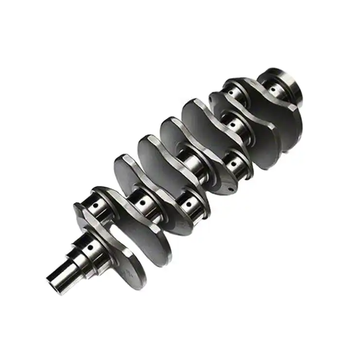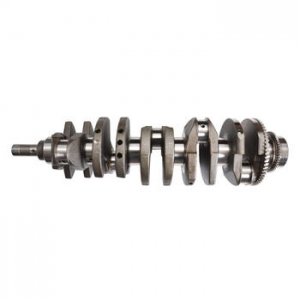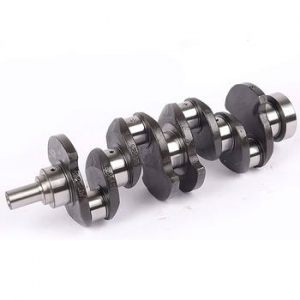When it comes to the heart of your Toyota engine, the crankshaft plays a pivotal role in converting linear piston motion into rotational force, ultimately powering your vehicle. For enthusiasts and performance-minded drivers, the debate often arises: should you stick with the Original Equipment Manufacturer (OEM) crankshaft or upgrade to a forged crankshaft? Understanding the nuances between these two options is crucial for optimizing engine performance, durability, and overall reliability. This article delves into a comprehensive comparison of Toyota forged crankshafts versus OEM crankshafts, analyzing their construction, performance characteristics, and suitability for various driving applications. We aim to provide a clear and insightful perspective to help you make an informed decision for your engine build or upgrade, whether you're aiming for daily driving reliability or pushing the boundaries of performance on the track or street.
Understanding OEM Toyota Crankshafts
OEM crankshafts, as the name suggests, are the crankshafts originally installed in Toyota engines at the factory. These components are meticulously engineered and manufactured to meet Toyota's stringent quality and performance standards. Typically made from cast iron or nodular iron, OEM crankshafts are designed for a balance of strength, cost-effectiveness, and longevity under normal operating conditions. Toyota invests heavily in research and development to ensure that their OEM crankshafts can withstand the stresses of daily driving, providing reliable performance over the lifespan of the vehicle. The manufacturing process for OEM crankshafts is often optimized for mass production, contributing to their cost-effectiveness. They are designed to work seamlessly with other OEM engine components, ensuring proper fitment and functionality within the intended engine configuration. For the average driver, or even those who enjoy spirited street driving without extreme modifications, OEM crankshafts often provide a perfectly adequate and dependable solution. Their design prioritizes longevity and predictable performance within the stock engine parameters.
Exploring the Advantages of Forged Crankshafts
Forged crankshafts represent a significant step up in terms of strength and durability compared to their OEM counterparts. The forging process involves shaping metal under immense pressure, which aligns the grain structure of the material, resulting in a component with superior tensile strength and resistance to fatigue. Typically crafted from high-quality steel alloys, forged crankshafts are inherently stronger and more resistant to bending and twisting forces. This increased strength is particularly beneficial in high-performance engine applications where extreme cylinder pressures and rotational speeds are encountered. Forged crankshafts are often chosen for modified engines, turbo builds, supercharged applications, and racing engines where the demands exceed the capabilities of OEM components. While forged crankshafts generally come at a higher cost than OEM crankshafts, the investment is often justified for those seeking enhanced engine reliability and the ability to withstand significantly increased power output. The improved durability translates to a greater margin of safety and reduced risk of crankshaft failure under strenuous conditions, making them a popular choice among performance enthusiasts.
Performance Comparison: Strength and Durability
The core difference in performance between Toyota forged and OEM crankshafts lies in their strength and durability characteristics. OEM crankshafts, while robust for standard applications, are designed with a specific power and RPM range in mind. They are engineered to handle the stresses of a stock engine without issue, but their material and manufacturing process limit their capacity for extreme loads. Forged crankshafts, on the other hand, are built to withstand significantly higher stresses. The forging process itself enhances the material's inherent strength, making it far less prone to failure under extreme pressure and high RPM conditions. In high-performance engines, especially those with forced induction or high compression ratios, the crankshaft experiences immense torsional and bending forces. A forged crankshaft's superior strength provides a critical advantage in these scenarios, reducing the risk of crankshaft failure, which can lead to catastrophic engine damage. For applications where engine longevity and reliability are paramount, even under demanding conditions, forged crankshafts offer a substantial upgrade over OEM options.
Weight and Balance Considerations
Beyond strength, weight and balance are critical factors influencing crankshaft performance. OEM crankshafts are designed with a specific weight distribution to ensure smooth engine operation and minimize vibrations at stock RPM levels. Manufacturers carefully balance OEM crankshafts during production to reduce parasitic losses and enhance engine efficiency. Forged crankshafts, while often stronger, can sometimes be heavier than OEM counterparts, depending on the design and material used. However, high-quality forged crankshafts are often meticulously machined and balanced to achieve optimal performance. In some cases, advanced forging and machining techniques can even result in forged crankshafts that are lighter than OEM crankshafts while maintaining superior strength. A lighter crankshaft can contribute to quicker engine revving and improved throttle response, enhancing overall engine performance. The balance of the crankshaft is equally crucial; an improperly balanced crankshaft can lead to vibrations, increased wear on bearings, and reduced engine lifespan. Therefore, whether choosing OEM or forged, ensuring proper crankshaft balancing is essential for smooth and reliable engine operation.
RPM Limits and High-Performance Applications
The RPM limit of an engine is directly influenced by the crankshaft's design and material properties. OEM crankshafts are typically designed for the stock RPM range of the engine, which is generally sufficient for everyday driving. Pushing an OEM crankshaft significantly beyond its intended RPM limit can lead to fatigue and potential failure, especially under sustained high-load conditions. Forged crankshafts, with their enhanced strength and durability, are designed to withstand much higher RPMs. The increased material strength and improved grain structure allow forged crankshafts to resist torsional stress and maintain their structural integrity at elevated rotational speeds. For high-performance engine builds intended for racing, track days, or aggressive street driving, where engines are frequently operated at high RPMs, a forged crankshaft becomes almost mandatory. The higher RPM capability translates to increased power output and a wider usable power band, crucial for competitive performance. If your performance goals include significantly raising the engine's RPM limit, upgrading to a forged crankshaft is a critical step in ensuring engine reliability and unlocking the engine's full potential.
Cost and Installation Factors
Cost is a significant consideration when comparing Toyota forged and OEM crankshafts. OEM crankshafts are generally more cost-effective due to mass production and less complex manufacturing processes. They are readily available and represent a budget-friendly option for engine rebuilds or replacements when maintaining stock performance levels. Forged crankshafts, on the other hand, typically carry a higher price tag. The more involved forging process, higher-grade materials, and often more precise machining contribute to the increased cost. However, the investment in a forged crankshaft should be viewed in the context of its long-term benefits, particularly in high-performance applications. While the upfront cost is higher, the enhanced durability and reduced risk of failure can save significant expenses down the line, especially in engines that are pushed to their performance limits. Installation for both OEM and forged crankshafts is generally similar, requiring specialized tools and expertise. It is crucial to ensure proper bearing clearances, torque specifications, and overall engine assembly procedures are followed meticulously for both types of crankshafts to guarantee optimal performance and longevity. Professional installation is highly recommended, particularly for forged crankshafts in high-performance builds, to minimize the risk of errors and ensure the engine's reliability.
Choosing the Right Crankshaft for Your Needs
Selecting between a Toyota forged crankshaft and an OEM crankshaft ultimately depends on your specific needs and performance goals. For daily driven vehicles, those used primarily for commuting and general transportation, and engines that remain largely stock, an OEM crankshaft is often perfectly adequate. It provides the reliability and longevity expected from Toyota engineering at a reasonable cost. However, if you are planning to significantly increase your engine's power output through modifications like turbocharging, supercharging, high compression pistons, or aggressive camshafts, a forged crankshaft becomes a highly recommended upgrade. Similarly, for those who frequently participate in track days, racing events, or engage in spirited driving where the engine is consistently pushed to high RPMs and loads, a forged crankshaft offers a crucial margin of safety and enhanced durability. Consider your budget, performance aspirations, and the intended use of your vehicle when making this decision. If reliability and longevity under extreme conditions are priorities, the investment in a forged crankshaft is often a worthwhile upgrade, providing peace of mind and unlocking the full potential of your engine build. Frankly speaking, it’s about matching the component to the demands you place on your engine.
Interactive Question: Forged or OEM - What's Your Priority?
Have you ever considered upgrading your crankshaft? Thinking about your own vehicle and driving style, which would you prioritize: the proven reliability and cost-effectiveness of an OEM crankshaft, or the enhanced strength and high-performance capabilities of a forged crankshaft? Perhaps you're building a dedicated track car, or maybe you just want added peace of mind in your daily driver. Understanding your own priorities – whether it's budget, performance, or long-term durability – is the first step in making the right choice. It's worth noting that even for slightly modified engines, a forged crankshaft can offer a degree of future-proofing and increased resilience. Conversely, for many drivers, the OEM crankshaft will continue to provide reliable service for hundreds of thousands of miles. What are your thoughts? What factors would weigh most heavily in your decision-making process when choosing between a forged and OEM crankshaft for your Toyota engine?
Our Role in Engine Performance and Reliability
At our company, we understand the critical importance of high-quality engine components, especially when it comes to crankshafts. Whether you're seeking OEM-level reliability or performance-enhancing upgrades, we offer a comprehensive range of crankshaft solutions to meet diverse needs. We provide both OEM-specification crankshafts, manufactured to exacting standards for dependable replacements, and high-performance forged crankshafts designed for demanding applications. Our forged crankshafts are crafted from premium materials and undergo rigorous quality control processes to ensure exceptional strength, durability, and balance. We understand that choosing the right crankshaft is a significant decision, and our team of experts is available to provide guidance and support, helping you select the optimal crankshaft solution for your specific engine build and performance objectives. We are committed to providing components that not only meet but exceed industry standards, ensuring the reliability and performance of your engine, whether it's for everyday driving or pushing the limits on the track. In my experience, investing in quality components from the outset is always the more cost-effective and rewarding approach in the long run, and crankshafts are no exception.
Conclusion: Optimizing Performance with the Right Crankshaft
In conclusion, the choice between a Toyota forged crankshaft and an OEM crankshaft hinges on a careful evaluation of your engine's intended use and performance requirements. OEM crankshafts offer a reliable and cost-effective solution for stock engines and everyday driving, providing the durability and longevity expected from Toyota engineering. Forged crankshafts, however, represent a significant upgrade in strength and durability, making them indispensable for high-performance engine builds, forced induction applications, and situations where the engine will be subjected to extreme stresses and high RPMs. While forged crankshafts come with a higher initial cost, the enhanced reliability and reduced risk of failure in demanding conditions often justify the investment for performance-minded enthusiasts. Ultimately, understanding the performance characteristics of each type and aligning your choice with your specific needs is crucial for optimizing engine performance and ensuring long-term reliability. Whether you prioritize factory-level dependability or are chasing maximum horsepower, selecting the right crankshaft is a fundamental step in achieving your engine goals. Remember to consider factors like engine modifications, driving style, budget, and long-term performance objectives when making your decision, and always prioritize professional installation and proper engine assembly procedures.
For more detailed information, please visit our official website: Toyota forged crankshaft




